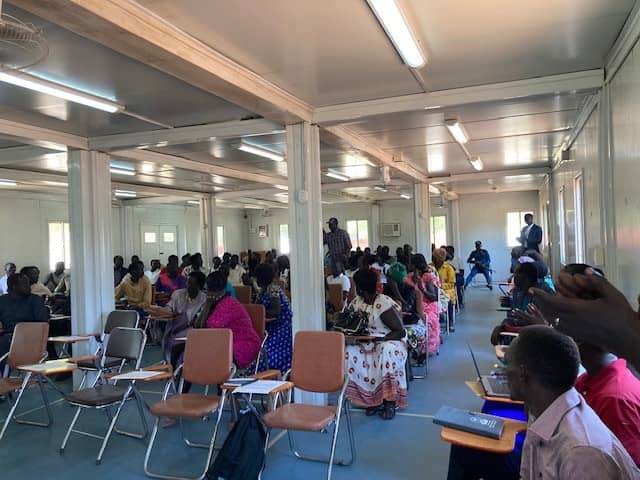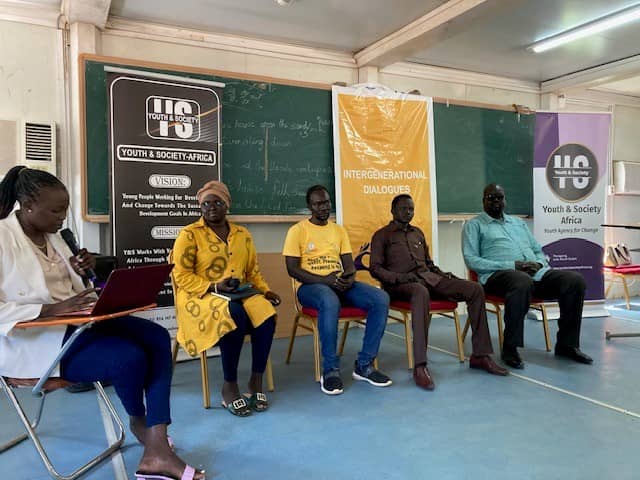With the growing need for intergenerational dialogues in South Sudan, the Embassy of the Kingdom of Netherlands in South Sudan and Youth and Society-Africa held the first ever Intergenerational Dialogue (IGD) in Jonglei state away from the capital, Juba on Thursday 15th June 2023. The theme of this IGD was on “TVET and higher education in Jonglei state”. It was a very timely discussion as the Dutch Ministry of Foreign Affairs is developing a program within South Sudan to support TVET and higher education. The IGD aims to be an open conversation between young and older generations on issues of importance for the country and all generations.
The dialogue was conducted in one of the few public higher education institutions in South Sudan, Dr. John Garang Memorial University of Science and Technology in Bor. The dialogue brought together a diverse attendance of more than 100 people from state government officials, students at the university, state youth and women associations, members of civil society, UN organizations and a team from Dutch Ministry of Foreign Affairs conducting assessments on TVET and higher education in South Sudan.
Image: © EKN South Sudan & Youth & Society-Africa
Embracing diversity
The IGD was highlighted by a panel discussion of four people from all generations representing different relevant institutions. Hon. Mabil Makuach, State Minister of Youths and sports, Hon. Gabriel Deng Ajak, Jonglei State Minister of General Education, Bol Deng Bol, Chair of Jonglei State Civil Society and Tabitha Amour, a gender Activist in civil society sat on the panel to lead the discussions moderated by Grace Aguil Garang, the Executive Director of Youth and Society and a member of the International Youth advisory committee for the Dutch Ministry of Foreign Affairs.
The Deputy Governor of Jonglei state, Hon. Akec Dengdit, officiated the IGD representing the Governor. With Jonglei state being a multi ethnic state with a history of tribal conflicts which involved young people, the deputy governor urged young people to embrace the diversities in the state and move out of tribal conflicts and go into education, entrepreneurship and development. "The role of the older generations in South Sudan was to liberate the country to its independence while the role of young people today is working towards economic development” he said while urging young people to explore the great opportunities that are available in agriculture with the many resources from the Nile, fertile land and livestock in South Sudan.
Threats to youth employability
“Quality Education is an entry into the development of the private sector” the vice chancellor of Dr. John Garang Memorial University, Prof. Abraham Matoc Dhal said while giving a presentation of the background of TVET and higher education in South Sudan from 1970 onwards. TVET programs were introduced in South Sudan with a focus on mechanics, agriculture, engineering and accountants. However, because of conflict at the time, most young people who graduated from TVET programs did not get to practice their skills in the market. Today more programs in nursing and agriculture have been introduced to the country, however most TVET centers are under-capacitated with trainers and teachers and underfunded. He also highlighted how higher education institutions are taking interest in incorporating TVET programs and modernizing these programs as essential to meeting market needs for young people.
The panelists spoke on the challenges that young people face on employability as unemployment is one of the biggest issues facing young people in Jonglei state and South Sudan. With conflicts, floods and illiteracy posing a threat to youth employability, the panelist highlighted the need for peace, awareness and capacity strengthening of institutions to create a space that provides opportunities for young people to be employed.
Tabitha, one of the panelist, strongly spoke of girls and women higher education challenges that are highly affected by traditional practices of forced- and child marriages which limits retention of young girls in higher education and TVET programs in Jonglei state.
Both ministers on the panel spoke on the institutional gaps and challenges facing higher education institutions and educational ecosystems in Jonglei state. With fewer resources such as teachers, libraries, access to the internet and quality curriculums has reduced the quality of higher education and TVET programs in Jonglei state.
Designing the new TVET- and higher education program
Key messages during the IGD for the new TVET- and higher education program included:
- Institutional reforms and policies development in curricula development and review, and regulating TVET programs and labor policies that support youth employment.
- Supporting public schools with resources to ensure that they can provide affordable and quality education for vulnerable and marginalized young people.
- Decentralization of scholarship programs to the states to ensure that more young people can access scholarship opportunities by providing opportunities of offline applications.
- Linking young people from TVET programs to the private sector institutions to provide direct access to employment opportunities
- Advocacy for girls and women representation and involvement in higher education and TVET programs by creating gender friendly spaces in these institutions and mentorship to young girls.
- Career guidance programs in higher education that prepare young people for employment and work.
- Modernizing TVET programs in South Sudan away from traditional skills for young people to meet labor market needs and modern technological skills
- Adding entrepreneurship training programs to TVET programs that give basic business skills to allow young people to create job opportunities.
- Creating more training for trainers and teachers training centers in the states to support more qualified teachers to support quality education.
The Embassy and Youth and Society-Africa are looking forward to leading more intergenerational dialogues across the country on social challenges and issues to provide a platform that informs policy, actions and collaborations between generations in South Sudan.

